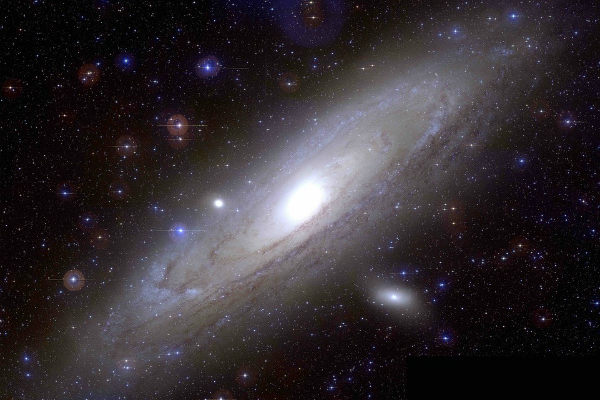The facts of the (dark) matter
July 16, 2018
Share

Top scientists from around the world have gathered at Queen's University this week to celebrate fundamental discoveries in the fields of dark matter and galaxy astrophysics, and to honour ten of the top minds in dark matter astrophysics. The symposium, entitled The Physics of Galaxy Scaling Relations and the Nature of Dark Matter, will feature a public lecture, and spotlight research results in the studies of dark matter, galaxy structure, and particle astrophysics during a time of unprecedented intellectual productivity and discovery in the field.
“To have these giants of dark matter and astroparticle physics gathered here in Canada is a truly rare opportunity that befits the prominent role that Queen’s scientists are developing in these research areas,” says Stéphane Courteau, Chair of the conference organizing committee and Queen’s Professor of Physics, Engineering Physics, and Astronomy. “Our guests of honour are the pioneers of these study areas and architects of models of our Universe in which a very large fraction of the matter is completely dark, so this is a unique and exciting opportunity to discuss the future of dark matter physics and to recognize our guests’ tremendous accomplishments.”
Running from July 15-20, the conference will not only feature panel discussions and invited lectures on some of the universe’s biggest mysteries, but will also serve as a celebration of the career contributions of the event’s ten guests of honour.
Among the distinguished guests is Sandra Faber, Professor Emerita from the University of California, who co-leads a Hubble Space Telescope project looking at galaxy formation back to the time of the Big Bang. She has been the recipient of major international awards, and was recognized most notably by U.S. President Barack Obama in 2013 with the National Medal of Science.
On July 19, Michael Turner from the University of Chicago – the researcher who originally coined the term dark energy – will be giving a free public lecture open to attendees, faculty, staff, students, and the Kingston community. Entitled The Dark Side of the Universe, his talk will explain what we know about the crucial roles of dark matter and dark energy play in shaping our universe.
“The complexities of the universe are vast and intricate, so the public lecture will be an excellent opportunity for the Queen’s and Kingston community to gain a clear, thought-provoking understanding of this research,” says Dr. Courteau. “It will also be valuable for current and prospective students who are considering pursuing this field of study, especially with the recent launch of the new McDonald Institute marking Queen’s University’s leadership role in astroparticle physics.”
Queen’s University recently launched the McDonald Institute (Arthur B. McDonald Canadian Astroparticle Physics Research Institute) in partnership with eight universities and five research organizations, cementing its reputation as a world leader in astroparticle physics. This week’s conference marks the most high-profile event hosted by the McDonald Institute since its May 2018 unveiling ceremony, organized in honour of its namesake, Queen’s professor emeritus and Nobel Laureate Arthur B. McDonald.
You can learn more about the conference or reserve your free space at the public lecture now.